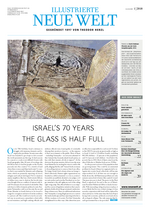Tensions between Israel and Syria are on the rise. The key player in this conflict is however no longer the US but Russia. Israeli Prime Minister Benjamin Netanyahu usually demonstrates confidence when meeting with heads of government. Yet, in his last encounter with President Vladimir Putin in Russia, he nervously fidgeted on his chair. He did not speak freely but held on to several papers, on whose reverse side big shakily scribbled letters were discernible. A visibly relaxed Putin smiled calmly, hardly commenting on Netanyahu‘s remarks. The ex-agent seemed to be clearly superior to the ex-elite soldier – a dominance reflecting Russia‘s political supremacy. Kremlin’s choices have hardly ever been more significant for Israel‘s security than today. Never has the Russian influence been greater in the Middle East than at present. This is also seen in the escalation of the Israel-Syria conflict. An Israeli fighter jet was shot over Syria and crashed. The two pilots were able to save their lives thanks to their ejection seats. It was the first Israeli fighter brought down in action since 1982.
Israel‘s air force immediately attacked Syrian and Iranian positions in Syria. Netanyahu said at a Cabinet meeting that Israel was prepared for further military operations: „We will inflict damage to anybody who tries to harm us „, he threatened. Iran, on the other hand, accused Israel of „lies“ intended to cover up the country‘s „crimes in the region”. The USA sided with Israel, which, formally, has been in a state of war with Syria for decades. Washington strongly “supports Israel‘s sovereign right to self-defense,“ said the US State Department. Russia however, which is considered an ally of Iran and Syria in the Syrian war remained conspicuously neutral. Russia called for restraint on both conflicting parties and warned of a „dangerous escalation“ in Syria. This showed once more: in this conflict, Russia does not take sides, but cleverly plays the actors of the region off against each other.
Parallel to his support of Iran and Syria, Putin has been cooperating with Benjamin Netanyahu for years. Every visit of the prime minister in Moscow was followed by a preemptive strike in the neighboring country. Many in Israel speculate that Putin is giving express permission for special, delicate operations. Israel refutes this, but there are clear signs of cooperation between Putin and Netanyahu.
Russia has air defense missiles of the S-400 type stationed in Syria. Russia does not use them against Israel, although it could do this easily. „Just as the Russians can harm Israel, Israel could also cross Russia’s political plans in the region in the future,“ says the Russia expert Alex Tenzer. „Putin does not want a war between Israel and Syria.“ Foremost because he needs Israel as a strategic counterbalance to the Iranians. Russia has bigger plans than a victory in the Syrian war. Putin wants, essentially, to replace the US’ supremacy in the Middle East. He pushes forward into the vacuum left by Barack Obama’s retreat in the region - a retreat that continues under Donald Trump and allows Russia to return as the controlling power.
In Libya, in Egypt, even in Saudi Arabia - Russia is increasing its influence everywhere. The support to Syrian President Bashar al-Assad can be repaid to Moscow in different ways - with weapon, oil and trade agreements, but particularly with new Russian military bases and ports. Those are probably Putin‘s main concern. It‘s a big geostrategic maneuver. The president wants to bypass Europe’s missile defense from the southeast and thus, corner the US. For Putin, all countries in the Middle East are important – Israel with its military power as well. Moscow has nonetheless ignored Israel’s demand to limit Iran‘s military presence in Syria. Russian weapons, including modern rockets, are sent to the Syrians and may even land in the hands of Hezbollah‘s Militia. Russian military cooperates closely with the Iranians, Russian diplomats support Iran in the UN Security Council. In many instances Moscow sides with Iran and against Israel. In the end, Putin positions himself always between all parties, thus remaining the mastermind in the Middle East.
This is due to the fact that, in the long term, the interests of Tehran and Moscow are diverging: they are, e.g., in competition for lucrative contracts for the exploitation of raw materials or the reconstruction of Syria. The ideologies of the radical Islamic State and secular Russia are irreconcilable.
Once the IS and the rebels supported by the West are vanquished, the last common enemy will have been defeated. Thereafter Iran aims at transforming Syria into a bastion against Israel and Sunni regimes while Russia strives for control in the Middle East, to expand and fortify its front against the West.
There is also a personal component: „Putin‘s emotional attachment to Israel should not be under-estimated“ says Russia expert Tenzer. He was the first to report that the Russian President since recently owns a small apartment located in Pinsker Street in Tel Aviv. „Putin gifted it in 2005 to his beloved teacher, who had taught him German - the basis for his career as a KGB spy.“ The teacher had emigrated to Israel in 1972 and had remained destitute. After Putin met her on a visit, he offered her the apartment. When she died in December, the childless woman bequeathed it to her patron.
